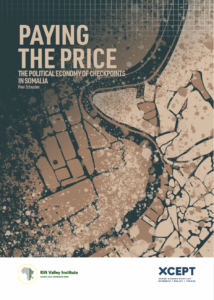SUMMARY
This report explores the political economy of checkpoints in Somalia: What drives their formation? What impacts do they have on trade, society and political projects? To explore these factors, new empirical data is presented on the distribution and costs of checkpoints operated by al-Shabaab and government actors, along with allied militia. Key findings are contextualized through interviews with key stakeholders and systematic review of earlier findings. The checkpoints are further situated in their historical context through detailed analysis of historical data.
The report delves into the significant interconnections between checkpoints, cross-border commerce and state formation in south-central Somalia, focusing in particular on two case studies. The first is the Baidoa corridor, a trade route linking the capital city, Mogadishu, with Kenya and Ethiopia. The second is the Garissa corridor, a trade route that connects the harbour city of Kismayo with the grazing lands of Afmadow and north-eastern Kenya. Both case studies illuminate the broader context of competition over the revenues that accrue from cross-border trade in the Horn of Africa.
This research paper is a product of the FCDO’s Cross-Border Conflict Evidence, Policy and Trends (XCEPT) programme, funded by UK aid from the UK government. XCEPT brings together leading experts to examine conflict-affected borderlands, how conflicts connect across borders, and the factors that shape violent and peaceful behaviour. The programme carries out research to better understand the causes and impacts of conflict in border areas and their international dimensions. It supports more effective policymaking and development programming and builds the skills of local partners.




